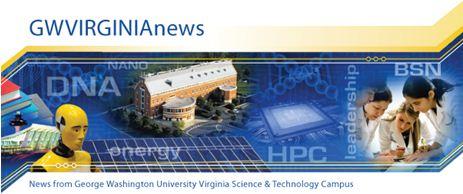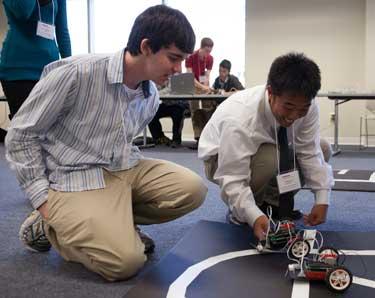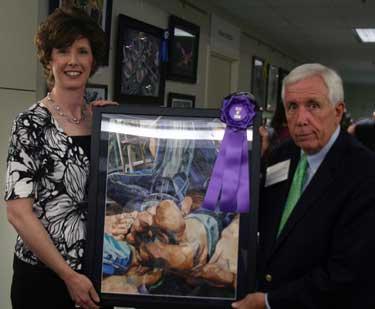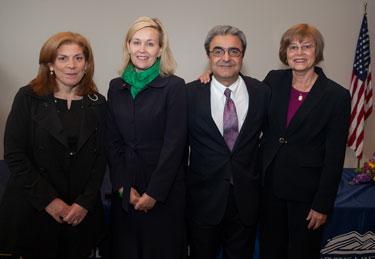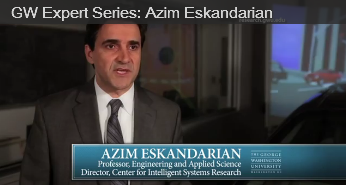GWVIRGINIAnews - June 2012 Issue
New Dean Asset to Campus and Region
From left to right: Frank L. Culbertson, senior VP for Orbital Sciences Corporation, former astronaut and international space station commander and Dr. Ali Eskandarian, dean, Virginia Science and Technology Campus,at GW's Sixth Annual Science, Technology, and Engineering Day. (Photo by Jessica Burt).
The first GW building opened in Loudoun County in 1991, at a time when there were only 90,000 residents, and the "dot-com boom" was a mere rumble. Soon thereafter, UUNet emerged as one of the first commercial internet providers, AOL relocated to its Dulles Campus, and Loudoun County spent more than a decade being known as one of the fastest growing counties in the United States.
Twenty years later, the bucolic countryside has been transformed into a vibrant, bustling suburban area with strong industry clusters, and the campus' development has kept pace with it. The campus has grown to five buildings, academic programs and research initiatives have evolved, and the Virginia Campus has been renamed the Virginia Science and Technology Campus (VSTC). The Dulles Technology Corridor is now home to the largest number of Internet, satellite, and defense companies in the nation, and has become a global digital center through which 50 percent of the world's Internet traffic passes.
It is an exciting time and place for a newly appointed dean of the VSTC, especially for Dr. Ali Eskandarian, a theoretical physicist with a professional background in space policy and scientific satellite development. MORE
Hands-on Workshops Expose High School Students to STEM-related Career Opportunities
Robotics Workshop at STE Day - Local high school students test a robot they designed and built that morning as part of a hands-on workshop at GW's Science, Technology, and Engineering Day. (Photo by Jessica Burt)
A group of students and their teachers huddle in a garage bay with a completely disassembled Toyota Yaris on one side and big-screen LCD monitors and computer equipment on the other. Their task is to analyze accident reports, review crash tests, and learn how computer simulations assess potential injuries to the vehicle occupants. Down the hall another group of students spend the morning integrating mechanical, electrical, and computer software systems through a microcontroller as they design and build their own robots. One floor up, another group of students in a simulation lab learns how technology-enhanced, high-fidelity manikins help train the next generation of nurses and health care providers.
This is not just another day in school for more that 130 select LCPS high school students and teachers. This is what happens when The George Washington University's Virginia Science and Technology Campus (VSTC), in partnership with Loudoun County Public Schools (LCPS) and Raytheon Corporation, team up at the university's state-of-the-art campus to expose students to opportunities in the fields of science, technology, engineering, and mathematics (STEM). MORE
Campus Hosts Congressional Art Exhibit
From left to right: Paula Harper, executive director of program development and management, GW Virginia Science and Technology Campus, and U.S. Rep. Frank Wolf, R-Va., announcing the Best of Show (Photo courtesy of Rep. Wolf's office)
The university, in partnership with U.S. Rep. Frank Wolf, R-Va., hosted the 10th District Congressional Art Show March 29 through April 20. The exhibit, on display at the GW Virginia Science and Technology Campus featured 260 works by 167 area high school students, representing 24 schools throughout the 10th Congressional District. Geographic representation included Clarke, Fairfax, Fauquier, Frederick, Loudoun, Prince William, Warren, and Winchester counties and the cities of Manassas and Manassas Park. MORE
GW Expands Advanced Nursing Education in Rural Virginia
From left to right: Lorraine Voles, VP for External Relations, GW; Laura Fornash, Secretary of Education, Commonwealth of Virginia; Ali Eskandarian, Dean, GW Virginia Science and Technology Campus and College of Professional Studies; Jean Johnson, Dean, GW School of Nursing. (Photo by William Atkins)
New Nursing Partnership - Nurses living in the Shenandoah Valley will now have an opportunity to earn advanced degrees from the George Washington School of Nursing through a new partnership with Dabney S. Lancaster Community College (DSLCC).
Jean Johnson, SON dean, signed a memorandum of understanding with Richard Teaff, president of Dabney S. Lancaster Community College in Clifton Forge, Va., in April 2012 that will allow DSLCC students or alumni to earn a bachelor's or master's degree from GW while still serving the communities they live in. The program is also open to any registered nurse with an associate's degree.
Note: GW's School of Nursing is headquartered at the Virginia Science and Technology Campus. MORE
Internationally Recognized Physicist Speaks on Campus in Conjunction with Conference
Dr. Rolland P. Johnson, an internationally recognized particle accelerator physicist, spoke to a group of business and community leaders April 6 about his work in the development of "New Nuclear Technology to Produce Inexpensive Diesel Fuel from Natural Gas and Renewable Carbon." This technology, part of the next generation of nuclear power applications, uses Accelerator-Driven Subcritical Reactors (ADSR) in nuclear power plants, which have the capability to operate in an inherently safe mode, generate no greenhouse gases, and produce minimal nuclear waste with no byproducts. MORE
A Degree of Security in Cyber Space
New master’s in cybersecurity—one of just a few nationwide—aims to fill growing need to shield against attacks.
A new graduate degree program in cybersecurity, launching this fall, will seek to meet the rapidly increasing global demand for experts able to confront the growing threat of cyber crime.
The degree, a computer science-oriented master's of science in cybersecurity, will be the first of its kind in D.C., and one of only a handful of graduate degrees in cybersecurity offered among top U.S. universities, according to Abdou Youssef, chairman of the Department of Computer Science. Students can enroll at the Foggy Bottom Campus in DC or the Virginia Science and Technology Campus in Ashburn, VA. MORE
Researchers at GW Receive Federal Funds to Study the Effect Earthquakes Have on Nuclear Reactors
A team of George Washington University researchers have received federal funding to study the effects earthquakes have on nuclear reactor cores. The findings of the research have implications for nuclear reactor construction and analysis well into the future. MORE
GW Named Research Partner in Toyota Automotive Safety Project
The GW National Crash Analysis Center (NCAC), on campus here in Ashburn, Va., has been named as one of Toyota's Collaborative Safety Research Center new research partners. NCAC will lead computer-simulated testing for an advanced crash-test dummy. MORE
University Launches GW Experts Series Featuring Campus Researchers
(click on picture to view video)
A new series of GW television advertisements highlights the work of GW researchers, including Dr. Azim Eskandarian, a transportation safety expert on this campus. He studies drowsy and fatigued drivers to help develop systems to prevent crashes. MORE
Subscribe
Please vstc gwu [dot] edu (subject: Subscribe%20to%20VSTC%20newsletter) (email )your request to be added to the electronic distribution list. Call (571) 553-5002 for additional information.
gwu [dot] edu (subject: Subscribe%20to%20VSTC%20newsletter) (email )your request to be added to the electronic distribution list. Call (571) 553-5002 for additional information.


